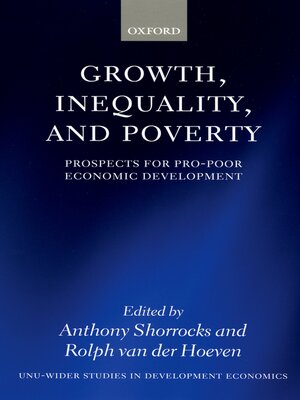Growth, Inequality, and Poverty
ebook ∣ Prospects for Pro-poor Economic Development · WIDER Studies in Development Economics
By Anthony Shorrocks

Sign up to save your library
With an OverDrive account, you can save your favorite libraries for at-a-glance information about availability. Find out more about OverDrive accounts.
Find this title in Libby, the library reading app by OverDrive.



Search for a digital library with this title
Title found at these libraries:
| Library Name | Distance |
|---|---|
| Loading... |
The relationship between growth, inequality, and poverty lies at the heart of development economics. This volume draws together many of the most important recent contributions to the controversies surrounding this topic. Some of the chapters help explain why there is profound disagreement on crucial issues of growth, poverty and inequality within academic circles, and among organizations and various groups active in the development field. Another central theme is the cross-country evidence on the relationship between growth and poverty, and the extent to which it is valid to draw policy conclusions from this empirical evidence. The volume also shows how new microeconomic techniques such as poverty maps and microsimulation models can be used to improve poverty analysis and the design of pro-poor policies. The overall conclusion points to the need for diverse strategies towards growth and poverty, rather than simple blanket policy rules. Initial conditions, specific country structures, and time horizons all play a significant role. Initial conditions affect the speed with which growth reduces poverty and can also determine whether policies such as trade liberalization have a pro-poor or an anti-poor outcome. Improved education is valuable in itself, and also contributes to poverty reduction; but its effect on inequality depends on supply and demand factors, which differ significantly across countries. Likewise, the quantitative impact on poverty of redistribution from the rich to the poor vis-à-vis an increase in total national income can vary greatly across countries. Hence the need for creative approaches to poverty which take full account of the specific circumstances of individual nations and which assign a central role to inequality analysis in the discussion of poverty-alleviation policies.







